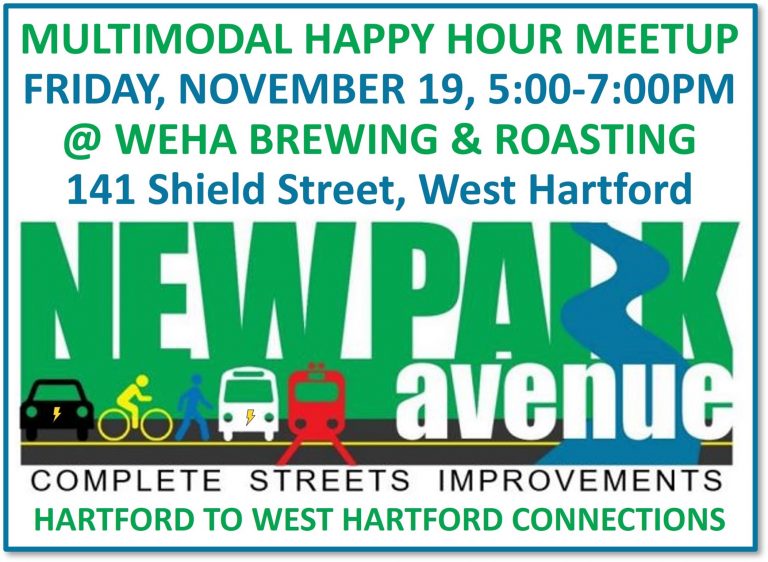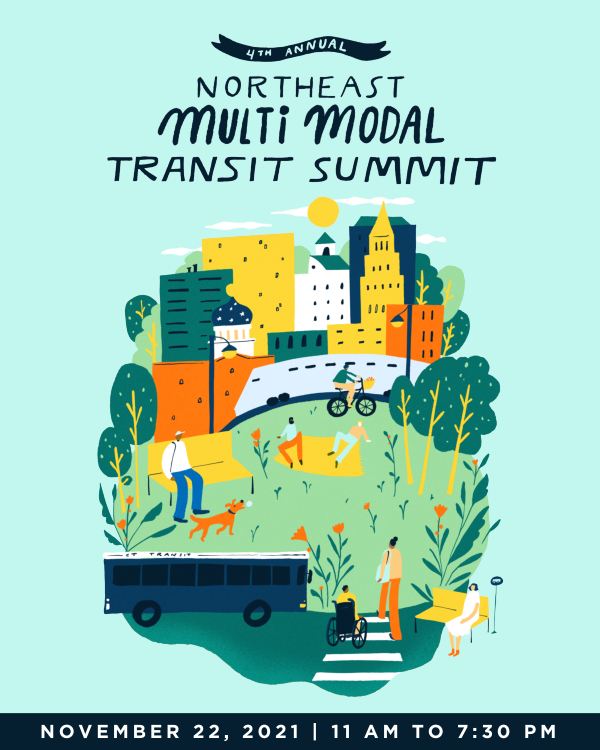2021 Multimodal and Transit Summit
Moving Forward: Greener, Safer, and Together
On November 22, The Transport Hartford Academy at the Center for Latino Progress organized the fourth annual 2021 Northeast Multimodal and Transit Summit. Transportation necessitates cooperation from all of us whether we are users, officials or public transit operators. The Summit brought together transportation professionals, community representatives , academics, and officials with the goal of helping decision-makers plan a future that meets the needs of our society. We urgently need to transition to sustainable modes of transportation and those modes of transportation must be safe for all users.
The summit was held online on November 22nd, from 11:00 am to 7:30 pm EST. We want to Move Forward – Greener, Safer, and Together. Together we will design what the future of North-East transportation should be.
We are in a moment when the issue of transportation is taking the national stage with the White House American Jobs Act. Investments to help us move on from the pandemic should not repeat past mistakes, such as highways dividing communities. Those very communities must be included in the decision-making process.
Recordings of the sessions are available here.
Contact for more information: Thomas Regan-Lefebvre, Transport Hartford Coordinator at the Center for Latino Progress, [email protected], (508)-863-9495

Event Schedule
Monday, November 22, 2021
Keynote: 11:15 am -1:15 pm
- Seleta Reynolds, General Manager, Los Angeles Department of Transportation
- Nuria Fernandez, Administrator, Federal Transit Administration
MOVING FORWARD
1:30 – 2:55 pm. Addressing racial transportation and pollution Inequities: the state/evaluation of the field. The Northeast region has one of the worst air pollution of our nation. Meanwhile, those who are most affected by air pollution are the least responsible for it. How to answer this unjust situation?
- Tenaya Taylor, Non Profit Accountability Group, Executive Director, moderator
- Union of Concerned Scientists
- Renae Reynolds, Tri-State Transportation Campaign, Executive Director
3:05 – 4:30 pm. Mobility opportunities for rural communities: rural communities are undeserved by public transportation and face unique challenges to transition from polluting modes of transportation: what are the available mobility opportunities for these communities? Those modes of transportation could be new or upgraded modes (buses, shared shuttles, internet, & deliveries.)
- Mary Tomolonius, Executive Director, Connecticut Association for Community Transportation, Moderator
- State Representative Christine Palm, Vice-Chair of the Environment Committee
- Michele Brooks, Vice-President, National Rural Transit Assistance Program
- Gloria Huerta, Carshare General Manager at Mobility Development
- Joseph Comerford, Executive Director, Estuary Transit District
6:05 – 7:30 pm. City and Nature: Connecting to the Connecticut River through Cities – a review of how Springfield and Hartford are researching, designing, and revitalizing greener multimodal pathways, with respect to lessons learned from maintenance challenges.
- Craig Mergins, Knox, Field Operations Manager
- Mary Rickel Pelletier, Director, Park Watershed, Moderator
- Kristen Sykes, Director of Southern NE Conservation Projects and Partnership, Appalachian Mountain Club
- Greg Tuzzolo, Managing Director of Stimson Studio
- Greg Poelker-McKee, Alena Conrad, Eli Grigorian, C. Joshua Holland, UMass Amherst Design Students
GREENER
1:30 – 2:55 pm. What priorities for sustainable mobilities/funding priorities? Moving forward requires prioritizing certain modes of transportation over other ones. This panel will engage with ranking what should be immediate and more long term transportation investments (trains, Fastrak, buses, autonomous):
- Josh Ostroff, Executive Director, T4Mass
- Chris Porter, Principal, Cambridge Systematic. RI.
- Kimberly Lesay, Bureau Chief, Bureau of Policy & Planning, CT Department of Transportation
3:05 – 4:30 pm. Electrifying transportation: According to a new report by Bloomberg New Energy Futures, electric micromobility vehicles (scooters, mopeds, motorcycles and three-wheelers) comprise the largest share of electric vehicles on the road today. Changing gears for faster transition includes scooters, e-bikes, electrification, shared EV programs (see Boston program).
- Holly Parker, Active Transportation Lead, SLR, Moderator
- Will Haskell, Co-Chair of the Transportation Committee, CT State Senator
- Paul Mondesire, Head of Policy and Community Engagement, Superperpedestrian
- Paul Vosper, CEO, Juice Bar
- Marissa Gillett, Chair of the Connecticut Public Utilities Regulatory Authority
- Creighton Randall, CEO, Mobility Development
6:05 – 7:30 pm. Multi-Use trails: connecting communities with walking and cycling trails.
- Laura E. Brown, Community & Economic Development Educator, University of Connecticut, Moderator
- Neva Taylor, On the Trail/Walk with Me Podcast
- Raul Irizarry, CT Program Manager, Trust for Public Land and Bridgeport Waterfront Project
- Bethany Yeo, Planning & Community Development Director at Town of East Longmeadow
SAFER
1:30 – 2:55 pm. Communities and policing/traffic enforcement for safer streets?
- Claudine Fox, Public Policy and Advocacy Director, CT ACLU
- Ken Barone, CT Racial Profiling Prohibition Project
3:05 – 4:30 pm. Transportation accessibility for reduced-mobility users:
- Betty Bajek, Chairwoman, Board of Directors at the Greater Waterbury Transit District
- Elaine Kolb, disability and mobility rights activist
6:05 – 7:30 pm. Streets for People: Street design, policy, and operations has centered the automobile for almost a century. What happens when we shift our frame to think about streets for people and place? This conversation will focus on policy, projects, and programs that make streets safer and more welcoming for people.
- Nat Gale, Director of Operations, City of Hartford, Moderator
- Garrett Eucalito, Deputy Commissioner, CT Department of Transportation
- Alycia Santilli, Director, Community Alliance for Research
- James Travers, Director Transportation, Mobility and Parking, City of Norwalk
TOGETHER
1:30- 2:55 pm: Infrastructure plans: getting communities involved in the process. The White House Infrastructure Investment and Jobs Act is aimed at bringing transformative infrastructure investment in the country: what mechanisms include communities in the designs and implementation of this program?
- Thomas Regan-Lefebvre, Coordinator, Transport Hartford Academy at the Center for Latino Progress, Moderator
- Michael Morehouse, Vice-President, FHI Studio
- Kevin Burnham, Greater Hartford Mobility Study, CT Department of Transportation
3:05 – 4:30 pm: Transportation and Climate Initiative, the Equity and Environmental Justice Advisory Board
- Alex Rodriguez, Climate Advocate, Save the Sound
- Katie Dykes, Commissioner, Department of Energy and Environmental Protection
- Dr. Mark Mitchell
- Maisa Tisdale, President and CEO, Mary and Eliza Freeman Center for History and Community
6:05 – 7:30 pm: Labor movement and the transition towards greener transportation
- Aziz Dehkan, Executive Director, CT Roundtable for Climate and Jobs
- Mustafa Salahuddin, President, ATU Local 1336
- Dr. Mary Donegan, Assistant Professor-in-Residence, Urban and Community Studies, University of Connecticut
ROUNDTABLE
4:30 – 6:00 pm: Community Development project: Community and Institutional Dialogue // Environmental Justice and being heard: community members who have been trying to make their voices heard in the creation of an equitable process:
- Vernice-Miller Travis, Executive Vice-President, Metropolitan Group
- Austin Brown, Senior Director for Transportation Emissions, The White House
- Karen Jenkins, Managing Principal, Development4Good
This Summit is supported by the Energy Foundation, Travelers, and Superpedestrian.
Elmwood to Parkville: Invisible Wall or a Cultural Connection?
Can the City of Hartford and Town of West Hartford integrate planning and investments, slow streets for safety, support small businesses, and improve walking, biking, and transit connectivity between Elmwood, Park Road, and the Parkville neighborhoods?
Housing density is growing near these important CTfastrak (bus rapid transit) stations, but how will residents who choose not to drive get around between them and to nearby destinations?
Bring your best ideas and join Bike West Hartford, BiCi Co., the Transport Hartford Academy, and Bike Walk Connecticut as we gather with neighbors, municipal staff, sustainable transportation advocates, and community leaders to start working across town lines to enrich both communities and improve safety.

